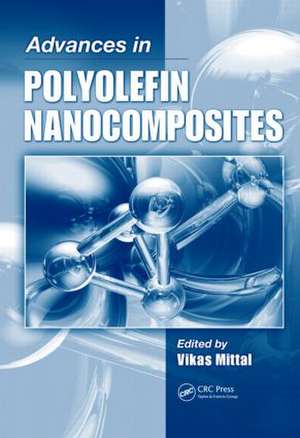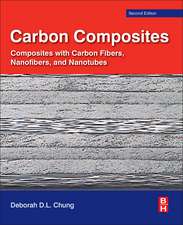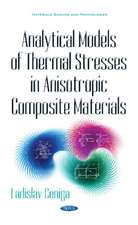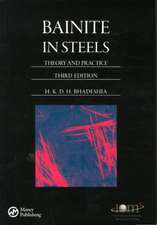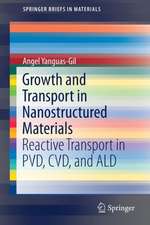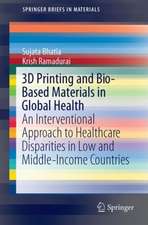Advances in Polyolefin Nanocomposites
Editat de Vikas Mittalen Limba Engleză Hardback – 7 dec 2010
- Sums up recent advances in nanoscale dispersion of filler in polyolefins
- Presents a basic introduction to polyolefin nanocomposite technology for the readers new to this field
- Provides insights on the use of technologies for polyolefins nanocomposites for commercial application
- Includes contributions from the most experienced researchers in the field
- Offers insights into the commercial usage of techniques
The text uses theoretical models to illustrate the organic–inorganic interfaces in polyolefins and also provides a detailed description of the recently developed models for property prediction of these nanocomposites. It concentrates on developments with not only aluminosilicate fillers, but also with equally important fillers like layer double hydroxides and nanotubes. The authors review polyolefin nanocomposite technology and methodologies of generation, properties and generation of composite blends, and advances in synthesis of nanocomposites using solution blending methods. The book covers theoretical and experimental considerations of clay surface modification and the importance and effect of various prominent filler categories.
| Toate formatele și edițiile | Preț | Express |
|---|---|---|
| Paperback (1) | 498.93 lei 43-57 zile | |
| CRC Press – 23 sep 2019 | 498.93 lei 43-57 zile | |
| Hardback (1) | 1343.11 lei 43-57 zile | |
| CRC Press – 7 dec 2010 | 1343.11 lei 43-57 zile |
Preț: 1343.11 lei
Preț vechi: 1637.94 lei
-18% Nou
Puncte Express: 2015
Preț estimativ în valută:
256.100€ • 269.05$ • 212.65£
256.100€ • 269.05$ • 212.65£
Carte tipărită la comandă
Livrare economică 07-21 aprilie
Preluare comenzi: 021 569.72.76
Specificații
ISBN-13: 9781439814543
ISBN-10: 1439814546
Pagini: 414
Ilustrații: Approximately 100 equations; 14 Tables, black and white; 319 Illustrations, black and white
Dimensiuni: 178 x 254 x 28 mm
Greutate: 0.92 kg
Ediția:1
Editura: CRC Press
Colecția CRC Press
ISBN-10: 1439814546
Pagini: 414
Ilustrații: Approximately 100 equations; 14 Tables, black and white; 319 Illustrations, black and white
Dimensiuni: 178 x 254 x 28 mm
Greutate: 0.92 kg
Ediția:1
Editura: CRC Press
Colecția CRC Press
Public țintă
Professional Practice & DevelopmentCuprins
Polyolefin Nanocomposites Technology. Nanocomposite Blends Containing Polyolefins. Polyolefin Nanocomposites by Solution Blending Method. Polyolefin Nanocomposites by Reactive Extrusion. Preparation of Polyolefin Nanocomposites by In Situ Polymerization Using Clay-Supported Catalysts. Effect of Clay Treatment on the In Situ Generation of Polyolefin Nanocomposites. Modification of Inorganic Fillers and Interfacial Properties in Polyolefin Nanocomposites: Theory versus Experiment. Polyolefin Nanocomposites with Layered Double Hydroxides. Microstructure and Properties of Polypropylene/Carbon Nanotube Nanocomposites. Polypropylene Nanocomposites with Clay Treated with Thermally Stable Imidazolium Modification. Functional Polyolefins for Polyolefin/Clay Nanocomposites. Preparation and Properties of Polyolefin/Needle-Like Clay Nanocomposites. Polyolefin Nanocomposites with Functional Compatibilizers.
Notă biografică
Dr. Vikas Mittai is Polymer Engineer at BASF Polymer Research in Ludwigshafen, Germany. A graduate of Swiss Federal Institute of Technology in Zurich Switzerland, his research interests include polymer nanocomposites, novel filler surface modifications, thermal stability enhancements, polymer latexes with functionalized surfaces, etc. He has authored more than 30 scientific publications and book chapters, and his research has led to a number of patents.
Descriere
Written and edited by pioneers in the field, this text elucidates recent advancements in polyolefin nanocomposites, shown to be commercially viable as nanocomposites across a number of fields, including biomedical science, aerospace, and automotive engineering. It focuses on theoretical models to understand the organic-inorganic interfaces in polyolefins and also provides a detailed description of the recently developed models for property prediction of these nanocomposites. It concentrates on developments with not only the aluminosilicate fillers, but also with equally important fillers like layer double hydroxides and nanotubes.
